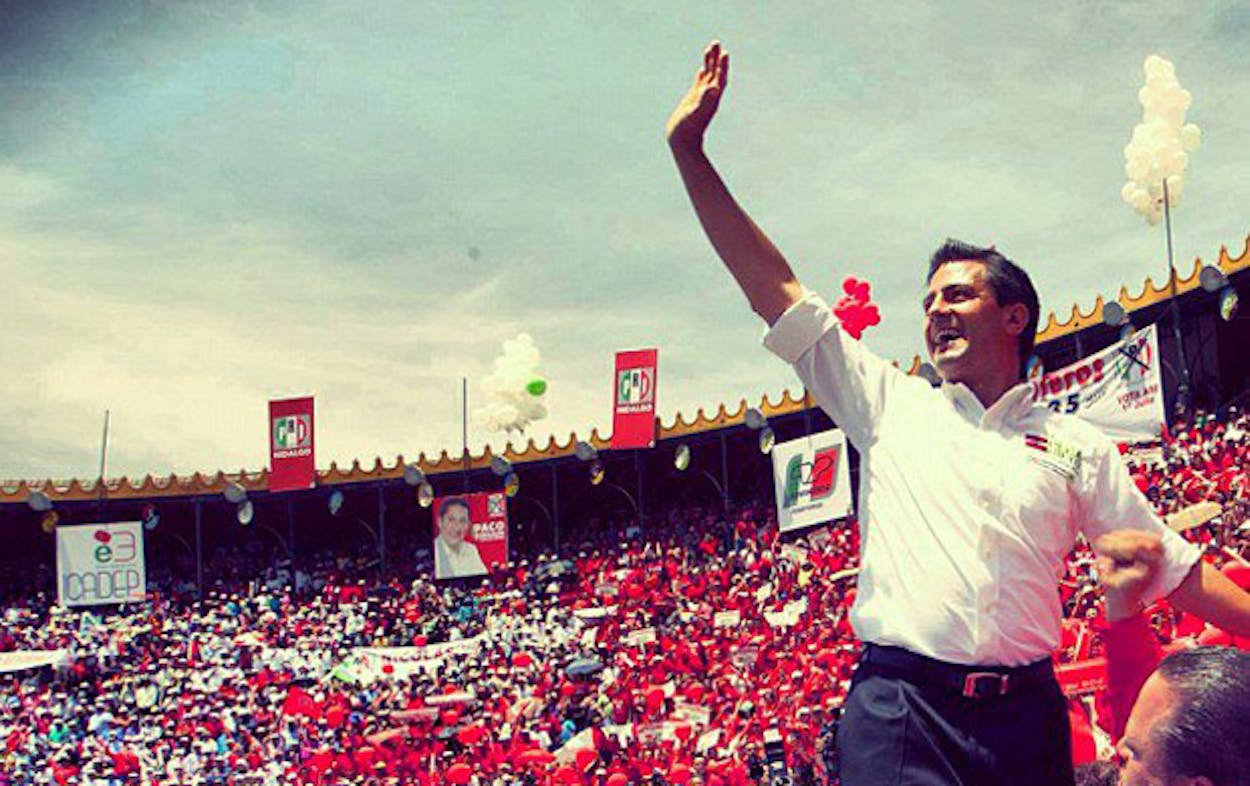Mexican voters appear to have selected Enrique Peña Nieto, a young leader of the Institutional Revolutionary Party, as their next president.
Peña Nieto bested both his major challengers in Sunday’s vote, including leftist candidate Andrés Manuel López Obrador and Josefina Vázquez Mota of the National Action Party (PAN), the Texas Tribune‘s Julián Aguilar reported. According to an early estimate, Peña Nieto received 38 percent of the 49 million ballots cast.
“With this election we all won, Mexico won,” Peña Nieto announced to his supporters at a PRI party, according to Aguilar. “To those who voted for other [candidates], I assure you I will govern with everybody and for everybody.”
Who is Enrique Peña Nieto? Dave Graham and Anahi Rama of Reuters dubbed 45-year-old Peña Nieto the “new face of Mexico’s old rulers,” seeming to view him as shiny new packaging for an old ideology.
“The smooth, boyish features, crisp white shirts and slick black hair parted perfectly from the left finally broke the spell that had frozen Mexico’s old rulers out of office,” they wrote. “Only a hint of gray at the temples betrays signs of age in Enrique Pena Nieto, the man who brought the Institutional Revolutionary Party (PRI) back in from the cold.”
Peña Nieto, a lawyer by training, came into his political power when he succeeded his relative, Arturo Montiel, as governor of the State of Mexico.
In this position he “proved himself a more progressive administrator than Mexicans were used to seeing from a PRI-ista,” according to Time‘s Tim Padgett. He worked both sides of the aisle and “shepherded through a raft of legislation that cut the state’s debt by about a quarter, ramped up investment and allowed the state on the capital’s northern flank to outperform the Mexican economy,” Reuters reported.
What has he promised to do as president? During his campaign, Peña Nieto promised to push GDP growth to six percent a year and stabilize the country by “beefing up law enforcement.” He hopes to accomplish that economic growth by privatizing more of Pemex, the state-owned oil company, and liberalizing labor laws, Reuters reported.
Last month, Peña Nieto told Padgett that “Mexico urgently needs a series of structural reforms that will detonate its true economic potential for once and generate more public welfare.”
Yes, but what about the drug war? Padgett reported that while Peña Nieto’s proposed solutions to the drug cartel violence have not been particularly innovative, he did take a moment Sunday night to “reassure Mexicans – and Washington – that he has no plans to go soft on drug trafficking, as the PRI did in the late 20th century,” Padgett wrote.
Some, including U.S. Representative Michael McCaul (R-Austin) have worried that he won’t do as much as President Felipe Calderón to combat drug violence. Officials in Texas and Washington will be watching this transition very closely, as Aguilar wrote:
The regime change is expected to be one of the world’s most monitored, as Mexican citizens and international observers watch to see how Peña Nieto attempts to restore peace to a country that has been plagued by drug violence for nearly six years. More than 55,000 Mexicans have died since 2006, when Calderón resumed the government crackdown against organized crime that his predecessor Vicente Fox began near the end of his presidency. Mexico’s economy and robust trade relationship with Texas, which has made the cities of Laredo and El Paso Mexico’s No. 1 and No. 2 trade destinations, respectively, will also likely be scrutinized after December.
(For more on what Texas lawmakers thought ahead of the election, visit Aguilar’s Sunday New York Times story.)
The PRI is notoriously corrupt. Will he make a break from the party’s past? Critics worry that Peña Nieto “may owe too many favors to too many people to take a stand against corruption in the PRI, which has been unchecked at state level since the party lost the presidency,” Reuters reported.
Some allegations of corruption emerged late in the presidential race, with the PAN accusing Peña Nieto of buying votes with $5.2 million worth of prepaid gift cards, according to the Associated Press.
Are there any personal scandals we should be aware of? There are shades of John Edwards in Peña Nieto’s biography: “In January he admitted cheating on his first wife, fathering two children with different women while married to her,” Reuters reported. His first wife died in 2007 after suffering an epileptic seizure and he is now remarried to soap opera star Angélica Rivera. In total, he has five children.
What’s the takeaway from the election? At the Woodrow Wilson Center’s Mexico Institute, Andrew Selee outlined what the election means for the future of Mexico. The PRI, won “a clear victory but not a resounding one,” with the party winning the country’s highest office but not taking control of the Senate, Selee wrote. The leftist party, “PRD lost the presidency but showed that the Left has mobilizing power.” This is good news for the future of Mexican democracy, he wrote, as “the PAN and PRD will have to learn to be responsible opposition parties, trying to shape the country’s future and hold the PRI accountable.”
Selee was impressed with Peña Nieto conducted himself during the election: “Enrique Peña Nieto was somber and thoughtful rather than triumphalist, praising President Calderón and all his opponents, recognizing the concerns of the student movement, and calling for action to move Mexico forward. It was a surprising display of maturity by all sides in a contentious election.”
Selee was heartened by the 62 percent voter turnout, a “historic high point” that will “means that politicians know that citizens will be watching what they do.”
- More About:
- Politics & Policy
- Mexico







